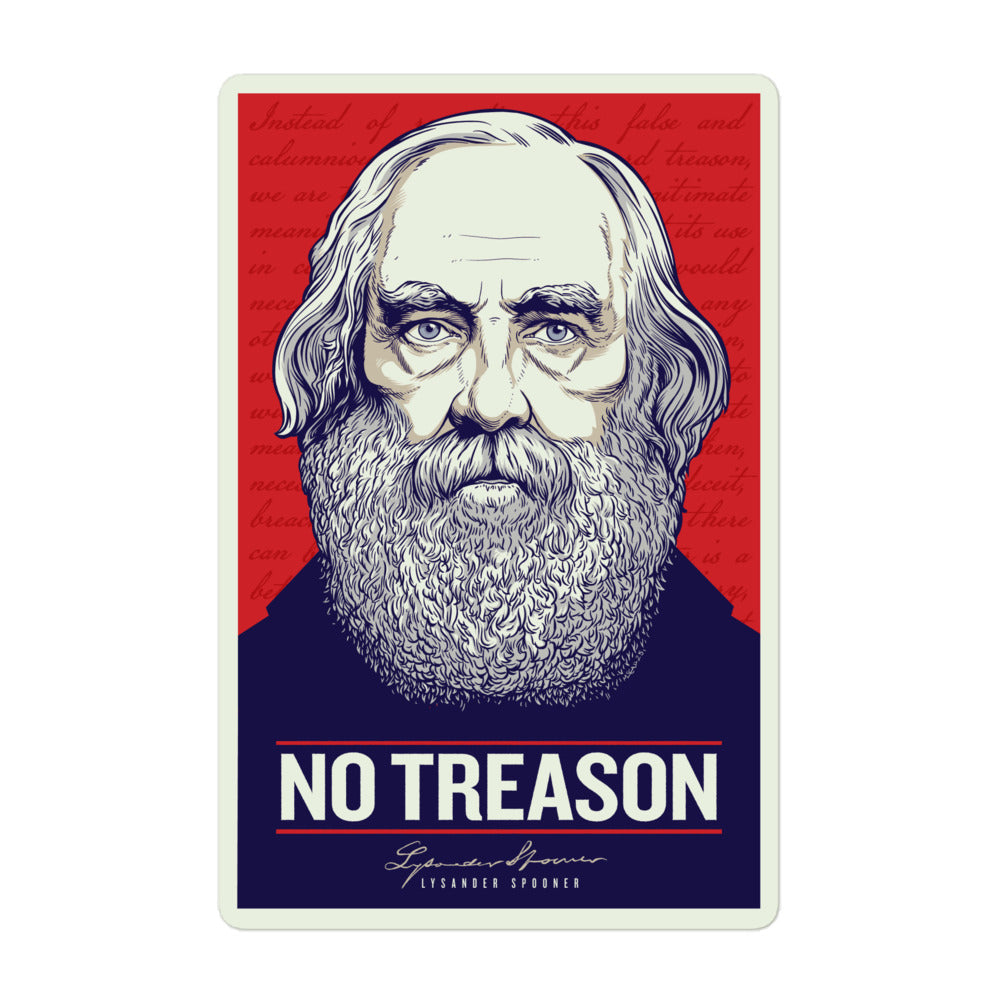Every piece I’ve bought has held up, looks great, and is actually comfortable to wear—can’t say that about a lot of brands. I’m hooked. Nothing else I’ve found comes close.
Lysander Spooner
Lysander Spooner (1808-1887) was an American abolitionist, lawyer, and political theorist who is best known for his contributions to the development of libertarian and voluntaryist ideas. Spooner was a significant figure in American society in the 19th century, and his ideas had a significant influence on the political and social debates of the time.
Spooner was born in Athol, Massachusetts in 1808. He received a limited formal education, but he was an avid reader and self-taught himself in a variety of subjects, including law, philosophy, and economics. Spooner began his career as a lawyer, and he quickly gained a reputation as a skilled and successful advocate for his clients.
One of the main ideas that Spooner developed and promoted was the concept of natural law, which holds that there are certain fundamental rights and principles that are inherent in human nature and that are independent of the laws or customs of any particular society. Spooner argued that these natural rights included the right to life, liberty, and property, and that they were protected by a "higher law" that was superior to the laws made by human governments.
Spooner's ideas about natural law were influenced by the ideas of classical liberal philosophers such as John Locke and John Stuart Mill, who argued for the importance of individual freedom and the protection of individual rights. Spooner also drew inspiration from the ideas of individualism and libertarianism, which both place a strong emphasis on personal freedom and the protection of individual rights.
In addition to his work on natural law, Spooner was also involved in the abolitionist movement, which sought to end slavery in the United States. Spooner was a strong advocate for the rights of African Americans, and he argued that slavery was a violation of natural law and a violation of the rights of individuals. Spooner's abolitionist views often put him at odds with the mainstream political establishment, and he was a controversial and often controversial figure in his time.
Spooner was also an advocate for the concept of voluntarism, which holds that all social and economic interactions should be voluntary, and that the initiation of force or coercion is morally wrong. This idea is similar to the concept of voluntaryism developed by Auberon Herbert in the late 19th century, and it is based on the idea that individuals have the right to make their own choices and to be free from coercion or interference from others.
During his career, Spooner wrote and published a number of books and articles on a wide range of subjects, including law, politics, economics, and social issues. Some of his most notable works include "Natural Law," "The Unconstitutionality of Slavery," and "No Treason: The Constitution of No Authority." In these works, Spooner argued for the importance of individual freedom and personal responsibility, and he criticized the use of state coercion to achieve social and political goals.
Spooner's ideas about natural law, voluntarism, and individual freedom were controversial and often drew criticism from those who believed in the importance of state intervention in social and economic affairs. However, his ideas also had a significant influence on the political and social debates of his time, and they continue to be discussed and debated by philosophers and political theorists today.
Indeed, there were several other individuals who also held similar views about the importance of voluntary interactions and the moral wrongness of initiating force or coercion in Spooners time. Here are a few examples of contemporaries of Spooner who had similar voluntaryist views:
-
William Lloyd Garrison: William Lloyd Garrison was an American abolitionist and journalist who is best known for his work in the anti-slavery movement. Like Spooner, Garrison was a strong advocate for the idea of natural law, and he argued that slavery was a violation of the rights of individuals. He also believed in the importance of voluntary interactions and the moral wrongness of initiating force or coercion.
-
Henry David Thoreau: Henry David Thoreau was an American writer, philosopher, and naturalist who is best known for his works "Walden" and "Civil Disobedience." Thoreau was a strong advocate for individual freedom and personal responsibility, and he believed in the importance of voluntary interactions. He was also critical of the use of state coercion to achieve social and political goals, and he argued that individuals had a moral obligation to resist unjust laws. (Henry David Thoreau items at Liberty Maniacs.)
-
Benjamin Tucker: Benjamin Tucker was an American individualist anarchist and editor who is best known for his work in the 19th century. Tucker was a strong advocate for the idea of individual freedom and personal responsibility, and he believed in the importance of voluntary interactions. He was also critical of the use of state coercion to achieve social and political goals, and he argued that individuals had the right to resist unjust laws.
-
Herbert Spencer: Herbert Spencer was an English philosopher who is best known for his contributions to the development of social Darwinism. Spencer was a strong advocate for the idea of individual freedom and personal responsibility, and he believed in the importance of voluntary interactions. He was also critical of the use of state coercion to achieve social and political goals, and he argued that individuals had the right to resist unjust laws.
These are just a few examples of contemporaries of Lysander Spooner who had similar voluntaryist views, but here were many other individuals in the 19th century who also held similar ideas about the importance of voluntary interactions and the moral wrongness of initiating force or coercion.
Overall, Lysander Spooner was a significant figure in American society in the 19th century. His ideas about natural law, voluntarism, and individual freedom had a significant influence on the political and social debates of his time, and they continue to be relevant and influential today. Spooner's contributions to the development of libertarian and voluntaryist ideas and his commitment to individual freedom and personal responsibility make him an important and enduring figure in the history of philosophy and political thought.
Reviews
Finally, a brand that’s got some guts! I ordered a shirt just for laughs, but now I’m back getting them as gifts for the whole family. No cheap prints or lame designs—this is the real deal.
My husband loved it. One shirt had to be exchanged, but it was easy. Will buy again.
Tiger stripes! Another cool manics shirt. Thanks guys!
Savage designs. I occasionally wear my shirts to work under another shirt and smile. They finally have really nice heavy tees that don't feel stiff. I didn't like their old zip hoodies because they were too lightweight and made by American Apparel, but now they have heavier ones that hold up.
Great quality. Most ‘patriotic’ gear is all flash, no quality, but not Liberty Maniacs. They’re clever, sharp, and have a sense of humor without being tacky. Proud to wear this stuff.
Super soft and insanely comfortable! I love my shirt, and my husband loves his hoodie… or should I say my new hoodie since I keep ‘borrowing’ it while he’s at work. It's definitely our favorite brand now.
Nice quality, soft cozy material.
Will definitely buy more. Shipping came on time. The sizing was good, and I got a ton of compliments on it.
This shirt? Chef’s kiss. Rocked it around town, and let’s just say it got some looks—can’t argue with launching a few politicians via catapult. Soft as hell material. 10/10
Great fit and quality as always!
I've learned to be more discriminating about the companies I buy from. I've been happy with both orders. Keep up the good work.
Liberty Maniacs nails it with the patriotic gear. I got the shirt with Lysander Spooner, and it’s hands down my new favorite. Not only is the design legit, but it actually feels like a shirt I want to wear (super soft, if you’re wondering). Plus, half the fun is when someone recognizes it. Can’t wait to see what other historical gems they come out with!


















